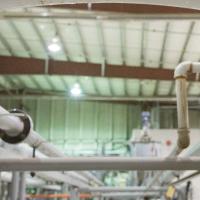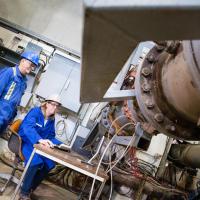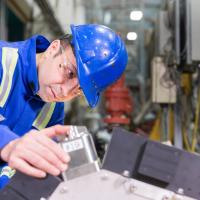Rapid, reliable instrumentation with on-line capabilities to accurately measure clays and other slurry characteristics—available as either a laboratory instrument or as part of a process control solution.
Clay minerals are extremely small, negatively charged particles that are highly reactive in industrial slurries, wastewater and soils. The characteristic that affects industrial processes is how reactive clays are with cations in the environment. Termed cation exchange capacity (CEC), this capacity is small in “inactive” clays like kaolinite to very large in “active or swelling” clays like smectite. Depending on which clay minerals are present, the CEC can vary significantly.
Active clay minerals cause significant problems during many plant operations because of their CEC properties, especially in any solid-liquid separation processes where they can lead to decreased equipment performance and increased reagent use.
For tailings management, even small amounts of active clays can prevent the solids from settling and water recovery.
Challenges with measuring clays and other slurry properties
It is important to measure clays accurately and in real time to take corrective action.
The difficulty in obtaining the real-time quantification of clay minerals is that they are notoriously tough to measure based on their small size and the very similar crystal structure.
SRC’s Pipe Flow Technology Centre™ recognized the need for a better approach for industry to make clay measurement simpler, faster and more reliable—and connected to process control systems to optimize costs.
So how can you get better, REal-time measurements?
Instead of quantifying the clay minerals themselves, it is much easier and more accurate to measure the CEC. Most industries measure the CEC using a manual laboratory method on a process sample that does not deliver real-time data. Some of the methods, such as the MBI (Methylene Blue Index), while straightforward, are time consuming and subjective.
With advances in technology, it is now possible and cost effective to use a spectrophotometer to measure the colour of a cationic dye (such as MBI or CuTrien) in solution that correlates with CEC values of a process stream. This dramatically improves reliability and decreases laboratory time.
The challenges with the spectroscopic method are that it needs to be adjusted for each application and calibrated each day.
Recognizing the need to further simplify the method for processes and laboratories, SRC has developed an automated measurement platform (AMP) that can connect on-line with pipelines and potentially other process streams. The AMP performs the spectroscopic CEC measurement from start to finish, including calibration and automatic filtering to 0.45 microns.
Instead of waiting hours or days to receive results, the AMP provides industries active clay measurement within 15 minutes, allowing them to adjust their process and quickly optimize their process additives.
Not just clays, but other properties too
SRC’s automated measurement platform can also be configured to perform other analytical measurements, including pH and conductivity, as well as quantify the insolubles present in a slurry with some method development, setup and validation.
How can industry take advantage of this technology?
SRC’s Pipe Flow Technology Centre™ team is here to support you with:
- More reliable manual clay measurements by applying spectrophotometry and customizing method development to your operations (for tailings management, processing or geological/mine planning). This allows for more reliable measurements and removes subjectivity and difficult-to-work-with blue dyes.
- Automating active clay measurements by incorporating our automated measurement platform in your facility or laboratory. This allows for automated, reliable and quick measurements.
- Automating active clay measurements online by adding our automated sampler to the AMP. This allows near real-time clay measurements for your process that allows you to benefit from more efficient process control.
- Automating other parameter measurement in your process flow by adding additional instrumentation to the AMP so that the filtered fluid can be subjected to additional measurements such as pH, water hardness or conductivity. This provides you with a complete characterization of your flow in near real-time that is difficult to obtain in abrasive and corrosive environments with traditional instrumentation.
- Advanced data analytics by developing a strategy for the automated transmission of the data collected by the AMP, especially in harsh operating environments with heavy equipment. Once the data is collected, SRC can develop a strategy for analyzing the data to obtain sophisticated, predictive models that, combined with Pipe Flow’s Slurry Model, can further optimize your plant’s performance.
In 2019, SRC was awarded $1.98 million from Natural Resources Canada’s Clean Growth Program to work towards the development of an active clay analyzer for the Canadian mining industry. The project partners included Suncor Energy Inc. and Northern Alberta Institute of Technology (NAIT).
SRC’s Automated Measurement Platform is patent pending in Canada, the United States and Brazil.




